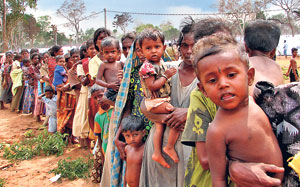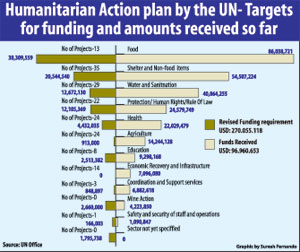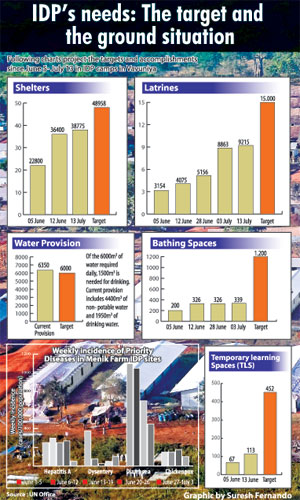Conditions in some of the camps housing Internally Displaced People (IDPs) are improving, but there are areas that need urgent attention, a UN report has revealed.
Water and sanitation, health and supply of complementary food items are some of the areas that need improvement, according to the UN Joint Humanitarian Update report issued for the week July 3 to July 10. The report has also highlighted as priority the need to improve drainage systems and the overall maintenance of the camps, especially in view of the oncoming rainy season in September
In the area of funds, the report says although an estimated US dollars 270 million is needed for ongoing relief activities and early recovery activities, only US dollars 97 million is available.
The report says 38 million US dollars was received for food items while 20 million US dollars was received for shelter and non food items including cooking utensils.
 |
| Long queues common scene at IDP camps still |
According to the report, 5,483 people have been released from the IDP camps upto July 10, while another 20, 000 people from nine villages north of Vavuniya have been given clearance by the Army to return return to their homes.
Some Non Governmental Organizations (NGOs) supplying complementary food items have informed the authorities that they are unable to do so due to lack of funds. World Food Programme (WFP) Country Director Adnan Khan confirmed that many NGOs have said they will not be supplying complementary food, including dried chillie, garlic and mustard from the end of this month.
Highlighting health issues the report said there was an increase in the number of meningitis cases among the IDPs in Menik Farm and 18 patients were transferred outside of the district for further treatment.
Meanwhile the Sunday Times learns that Chicken Pox, Hepatitis -A and respiratory diseases are prevalent among some IDPs in the Vavuniya camps, although the number of cases had decreased overall. A health official who did not want to be named stressed the importance of reducing the congestion in the camps as this was a major contributory factor for the spread of communicable diseases. The official also warned that the approaching rainy season could make matters worse adding that the lack of a system for early detection was hindering health care activities in the camps.
The Joint Humanitarian Update report also highlights the need for improved water and sanitation standards. Another constraint facing relief workers is the lack of human resources. According to the GMOA there are only 30 to 40 doctors working in the IDP camps whereas at least 120 doctors and 3000 nurses were needed.
Water and sanitation is another area that needs more improvement in many of the IDP camps. Out of the estimated 15,000 latrines required only 9215 have been constructed. The report has highlighted the lack of suitable land to build more latrines.
The report also says there is insufficient information on morbidity and mortality rates to support mitigation of water borne diseases.
 |
| Long trek to collect water. Pic by Priyantha Hewage |
Water distribution too still remains inconsistent across the camps, the report said. This situation has resulted in long queues of people waiting to collect water. According to sources in the area there was also a lack of drinking water although 3000 cubic metres is reported to be distributed among the IDPs.
According to earlier reports some of the camp sites are in the path of floodways or in low lying areas which would result in flooding of the camp space sites during the rainy season thus highlighting the importance of urgent drainage facilities..
Local authorities are now planning to divide Menik Farm zone two into a number of small villages due to security concerns. This would result in the relocation of close to 20,000 IDPs. Further it has been reported that the competent authority has requested for assistance to get building materials for 1600 shelters to house LTTE surrendees. These shelters would be constructed by the military.
Government funds have also been released to facilitate cement-based floors in the camps in the government-managed zones. However shelter agencies have recommended against such concrete slabs on 'technical grounds'.
According to the report only 32, 800 IDP children out of 90, 000 are currently participating in education activities. Hundred and thirteen temporary learning spaces have been created. According to the student ratio 452 such spaces are required.
Depression setting in
A medical officer working with authorities providing relief services for the IDPs speaking to the Sunday Times said that there was a noticeable number of people suffering from some form of depression in the camps.
According to this official who did not want to be named many have complained of lack of sleep, body pains and headaches.
"This is an early sign of depression. Doctors find increasing number of patients coming to them with these minor complaints. The individuals have visited the doctor with the same complaints several times over. They are getting tired of camp life. With nothing to do except waiting in queues all morning and being in congested places for a prolonged period of time are taking a toll on these people.
According to the official, hygiene was a problem with camps being swamped with flies.
"The authorities say that they are spraying to kill the flies but there is hardly any improvement. Whether any action is being taken is really questionable," the officer said.
According to him some of the issues that rise in the camps can be avoided if there was a proper implementation-mechanism in place.
"The government has sent enough provisions but whether the decisions and plans are being properly implemented is doubtful judging by the current situation," the officer added.


|




